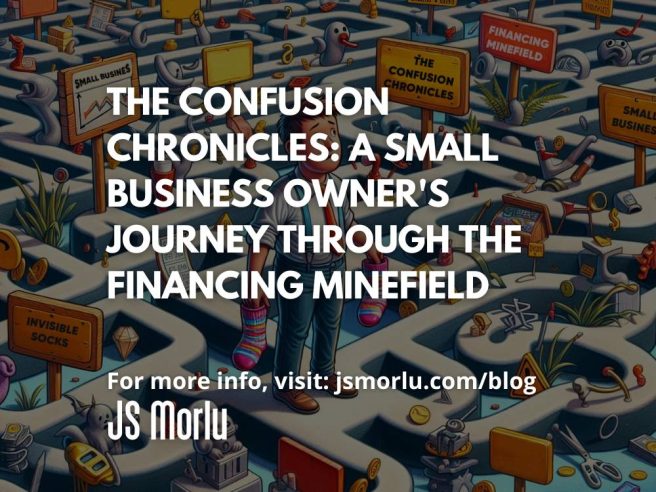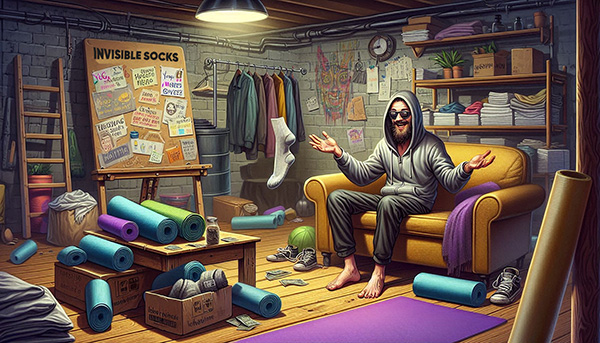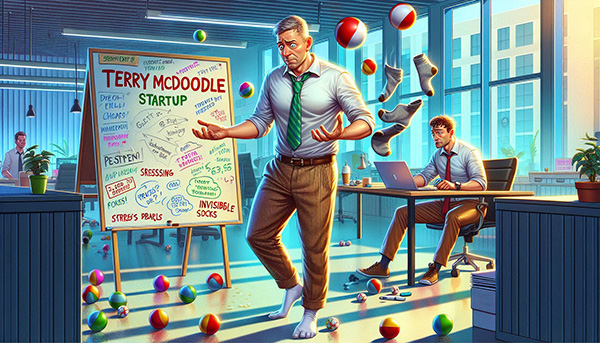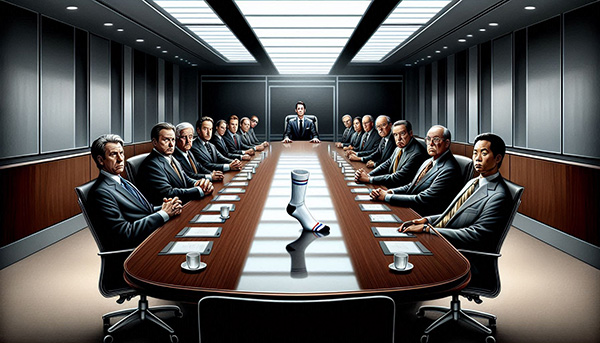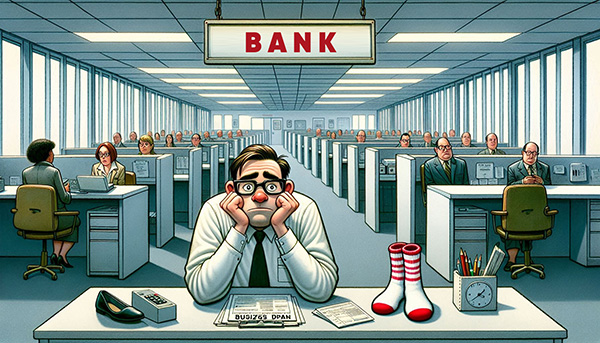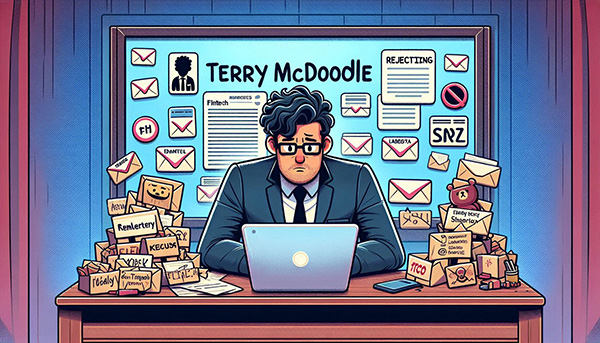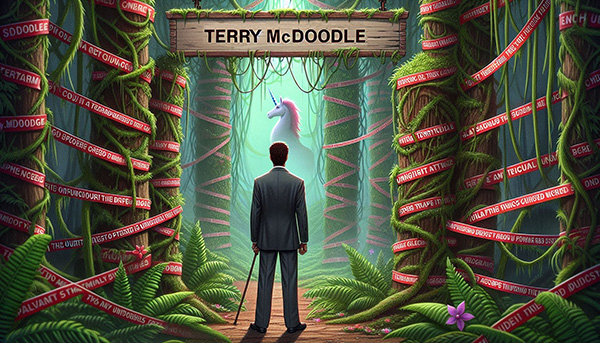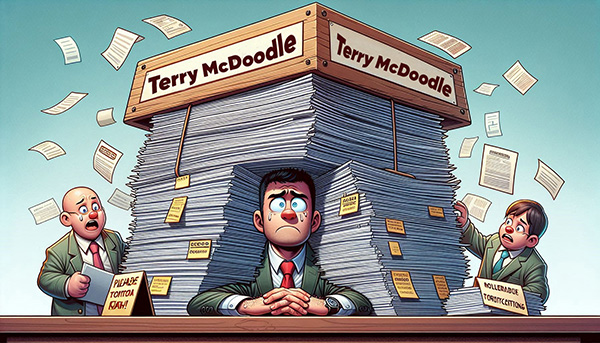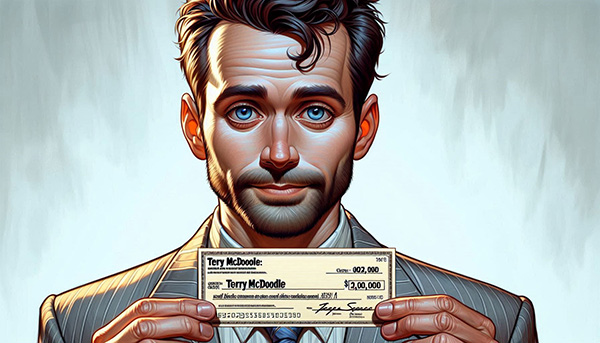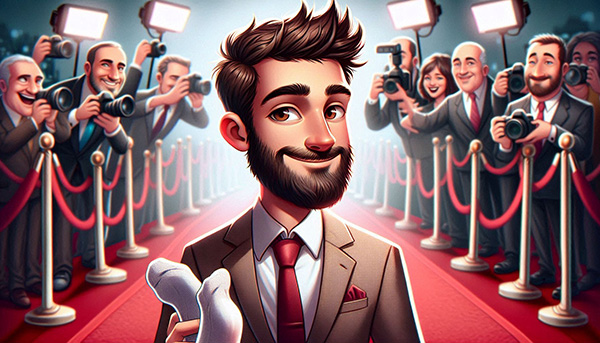By: John S. Morlu II, CPA
Meet Terry McDoodle, an unshakably optimistic entrepreneur hailing from the quaint and perpetually hopeful town of Ambitionville. Fresh off a three-day motivational TED Talk binge—fueled by a dangerous mix of caffeine, boundless enthusiasm, and a sprinkle of sheer delusion—Terry was ready to make his mark in the world of startups. His billion-dollar idea? A revolutionary line of invisible socks. Yes, you read that right—invisible socks—designed for people who have always despised socks but were tired of having to admit it.
“Why stop at comfort when you can have freedom?” Terry mused to anyone who’d listen. “Invisible socks! They’re breathable, they never need washing, and they match everything!” Sure, his product didn’t technically exist, but hey, neither did Bitcoin at first, right? Armed with dreams, pure delusion, and absolutely zero funding, Terry boldly ventured into the startup world, convinced he was one quirky pitch away from making Forbes’ “30 Under 30.”
What followed was less of a journey and more of a tragicomic odyssey through the confusing and often absurd landscape of startup financing. It was a world full of buzzwords that sounded like bad superhero names, acronyms no one could decode, and wild promises that dissolved faster than sugar in hot tea. From incubators to accelerators, angel investors to venture capitalists, every path Terry explored seemed like the next surefire ticket to success—and just as often, a dead-end plunge into a dark abyss of mounting debt, shattered dreams, and eye-watering interest rates.
But logic and common sense were never obstacles for Terry. He was determined, armed with a relentless belief that someone—anyone—out there would be as excited about invisible socks as he was. After all, as every entrepreneurial cliché had told him, success was just one pitch, one meeting, one serendipitous handshake away. Surely, somewhere in this tangled mess of startup jargon, Terry’s ticket to fame and fortune awaited.
And so, Terry began his long, treacherous journey into the bewildering minefield of small business financing. Each twist and turn promised salvation in the form of cryptic financial institutions, shadowy investors, and workshops led by “business gurus” who were more adept at selling e-books than giving actual advice. But Terry had hope—hope, and an unyielding belief in the power of nonsense disguised as innovation. Join us as we follow Terry on his laughably disastrous (but weirdly inspirational) adventure through the world of small business funding, one baffling acronym at a time.
Will he secure the investment of his dreams? Or will Terry, like so many before him, discover that the only thing more elusive than success is an investor who actually understands invisible socks?
Chapter 1: Incubators – Where Dreams Go to Hatch…or Scramble
Terry’s first stop on his funding adventure was the local incubator, a delightfully named establishment called “Eggcellent Ventures.” The name alone gave Terry hope. After all, what better place for his invisible socks to hatch into a fully-fledged startup than a nurturing environment where seasoned entrepreneurs help guide baby ideas until they can fly—or at least wobble unsteadily out of the nest?
Eggcellent Ventures was run by Chad Broflowski, a man with more failed startups than facial expressions. Chad had the kind of swagger that only comes from a mixture of deep delusion and bottomless caffeine consumption. Sporting a hoodie despite the blistering 95-degree heat outside, he oozed that classic startup chic vibe. He was the kind of guy who could say “disruption” and “synergy” in the same sentence without blinking.
“Bro,” Chad greeted Terry, eyes wide with the zeal of someone who hadn’t slept since 2017, “Eggcellent isn’t just an incubator. It’s a lifestyle. We don’t just incubate ideas here. We incubate dreams.”
Terry’s invisible socks—designed for people who wanted the illusion of wearing socks without the hassle of actually doing so—seemed like a perfect fit for Chad’s weird, but weirdly appealing incubator. Chad thought so too, at least after Terry threw in some buzzwords like “frictionless” and “scalable.” The catch? A 10% equity stake and mandatory participation in daily yoga sessions. Because as Chad passionately explained, “You can’t build a billion-dollar company if your chakras are out of whack, bro.”
For a modest $500-a-month membership, Terry could work out of Eggcellent’s “communal co-working space”—which, despite the glossy brochure photos, looked suspiciously like Chad’s basement. The walls were adorned with motivational posters that said things like, “Fail Fast, Fail Often,” which Terry found oddly comforting considering the circumstances. He was surrounded by other “game changers,” like a guy who was trying to revolutionize staplers by making them Wi-Fi enabled and a woman with an app that turned pictures of clouds into motivational quotes (because, apparently, the world needed more cloud-inspired wisdom).
It didn’t take long for Terry to realize that Eggcellent Ventures wasn’t so much about incubating ideas as it was about incubating mediocrity. The “mentorship” sessions mostly involved Chad rambling about the time he almost landed a deal with a venture capitalist, and the “networking events” were just thinly veiled excuses to eat free pizza while pretending to work.
After a week of brainstorming sessions that felt more like forced group therapy and attempting downward dog in an overcrowded yoga class, Terry had an epiphany. Why pay $500 a month to daydream about becoming the next Steve Jobs when he could do it for free in his own garage?
And so, Terry bid farewell to Eggcellent Ventures, vowing that the next time he heard the word “synergy,” it would be from the safety of his own couch.
He left Chad with a hearty handshake and the kind of polite, “We’ll keep in touch,” that everyone knows is code for “I will delete your email the moment I get home.”
Chapter 2: Accelerators – Fast Track to Nowhere
Fresh off his escape from Eggcellent Ventures, Terry figured it was time to step things up a notch. Enter the world of accelerators, where startups supposedly zoom from zero to hero faster than you can say, “series A funding.” These programs were advertised as the ultimate express lane to IPOs, private jets, and—most importantly—your very own TED Talk, the pinnacle of any entrepreneur’s existence.
Terry set his sights on HustleHaüs, an accelerator known for turning napkin-doodles into six-figure businesses in just six months. Or so the glossy brochure, printed on eco-friendly, unicorn-tear-soaked paper, would have you believe. The tagline? “We take 20% equity and turn you into the next unicorn!” That’s right: a whopping one-fifth of Terry’s invisible sock empire in exchange for what they called “mentorship,” though Terry soon realized this meant being bombarded with words like “synergize,” “disrupt,” and “scalability” until they lost all meaning.
HustleHaüs was led by Trent “Crush It” Davidson, a man who apparently hadn’t slept since launching his first startup in a college dorm. Trent exuded confidence—and also a fair bit of sweat, probably from all the motivational push-ups he did before breakfast. His philosophy? “Fail fast, fail often, and if you’re not failing, you’re not trying hard enough!” Judging by the massive whiteboard in his office labeled “Epic Fails“, HustleHaüs was a raging success in failing fast. Each entry represented a startup that had crashed and burned in spectacular fashion: “Gourmet Paper Towels,” “Pet-Specific Dating App,” and Terry’s personal favorite, “Wearable Pineapples.”
Terry was eager to get his invisible socks on the fast track. But first, the HustleHaüs team insisted he needed to pivot. After all, “pivoting” was the accelerator’s bread and butter—though Terry quickly realized that in startup speak, pivot really meant, “completely abandon your original idea and scramble for something that makes sense to no one.”
“Look, Terry, invisible socks are cool and all,” Trent said while nonchalantly juggling three stress balls, “but they’re just not disruptive enough. We need something that screams ‘game-changer,’ like… I dunno… Visible Sandals!”
Yes, you read that right. Visible Sandals—an audacious rebrand of socks that don’t exist into sandals that… well, do. Apparently, sandals needed a spotlight, and the HustleHaüs team was ready to shine it.
Terry, ever the optimist, embraced the pivot with both arms (and feet). But just as he was getting ready to relaunch his product as the footwear revolution nobody asked for, he received some crushing news: a startup in Silicon Valley had already raised $15 million for the exact same concept. They even had a celebrity endorsement from a minor actor in a Netflix original that nobody watched. Trent’s advice? “Pivot again, bro. That’s the hustle.”
It was at this moment that Terry realized HustleHaüs wasn’t a fast track to success—it was more like being strapped to a treadmill, forever pivoting in circles until you either passed out or forgot what you were even trying to accomplish in the first place. After weeks of buzzwords, whiteboards, and more mandatory “energy breaks” than Terry could stomach, he knew it was time to cut his losses.
As Terry left HustleHaüs with a brochure for their “Elite 2.0 Accelerator Program” (priced at just $10,000!), he couldn’t help but wonder—was he getting closer to the land of IPOs, or had he just fast-tracked himself to Nowhereville?
Chapter 3: Angel Investors – Divine Intervention? More Like Lucifer in Prada
Terry’s journey next took him into the lofty—and somewhat ominous—world of angel investors, where dreams were supposedly lifted on golden wings, and cold, hard cash rained down like manna from heaven. At least, that’s how it worked in the fairy tales startups loved to tell. In reality, the world of angel investors was more like a poker game in the back room of a shady casino—except everyone wore designer suits and spoke exclusively in jargon like “ROI” and “exit strategy.”
Enter Fiona “Moneybags” Devereaux, an angel investor with a net worth so large it had its own gravitational pull. She was a socialite with a passion for bizarre business ventures, the kind of woman who’d invest in anything that was both nonsensical and trendy. Fiona had once funded a company that sold “artisanal bottled air” to hipsters in Brooklyn, and rumor had it that she also backed a line of custom leather fanny packs for dogs. Yes, you read that correctly.
Terry, still determined (and slightly delirious after his stint at HustleHaüs), managed to snag a spot at one of Fiona’s infamous networking events. Held in a mansion so grand it probably had its own zip code, the gathering was a who’s who of the absurdly wealthy and the questionably employed. The appetizers were tiny, the egos were massive, and the atmosphere was thick with the scent of freshly minted dollar bills and artisanal kombucha.
Clutching a plate of something he couldn’t identify, Terry nervously approached Fiona, who was perched on a velvet chaise lounge as though she’d been born there. She was dressed head-to-toe in designer labels, her champagne flute clutched like a scepter. The rumors about Fiona were all true—she was both intoxicating and terrifying, like a lioness deciding whether to maul you or groom you.
“Invisible socks, you say?” Fiona mused, raising an eyebrow as Terry pitched his product with the enthusiasm of a man who hadn’t slept in three days. “That’s the kind of absurdity people will throw money at,” she purred, swirling her champagne like it was tap water. “It’s genius. Ridiculous, but genius.”
Terry’s heart leapt. Was this it? Had he finally found someone who understood the sheer brilliance of his invisible socks? Before he could respond, Fiona made him an offer: $100,000 for 30% equity, right there on the spot. It was more money than Terry had ever dreamed of, and for a brief moment, he imagined himself riding the startup rocket straight to the moon—or at least to a beach house in Malibu.
But, of course, there was a catch. Because nothing in the world of high-stakes investing comes without strings attached. Fiona wanted Terry to sign the deal immediately, during a live horse polo match happening just outside the mansion. “I love the rush of high-stakes decisions,” she said with a devilish smile. “Business should feel like a gamble, darling.”
Terry, still trying to figure out if horse polo was even a real thing, found himself being led outside, champagne in hand. Polo players dressed like they’d just stepped off a Ralph Lauren runway thundered across the field as Fiona waved the contract in front of him like it was a party favor.
Fiona’s investments were notorious. She treated her portfolio like a roulette wheel, tossing money at whatever felt right in the moment. If a startup tanked, she’d shrug and move on to the next shiny object in her lineup. After all, what’s a few hundred thousand lost when you could buy a small country just for fun?
As Terry watched one of Fiona’s current startups—a luxury juice cleanse for cats—implode in real-time on Twitter, his enthusiasm began to wane. Was he really ready to sell 30% of his company to someone who might forget about it in a week? Sure, $100,000 sounded great, but was it worth being tethered to a woman who could turn his entire business into a quirky footnote in her investment scrapbook?
After some intense soul-searching (and an awkward moment where a polo ball narrowly missed his head), Terry decided to politely decline Fiona’s offer. “No offense,” he said, as one of her prized ponies trotted by, “but I don’t think I’m ready for this level of… unpredictability.”
Fiona, unfazed, waved him off with a laugh. “No worries, darling. I’ve got three other startups on deck. But if you change your mind, call me.”
As Terry walked away from the mansion, the sound of galloping horses fading into the distance, he couldn’t help but feel both relieved and slightly dizzy. He might not have gotten the funding, but at least he wasn’t in debt to someone whose wealth could buy an island, turn it into a theme park, and abandon it the moment something more exciting came along.
With his pride intact and his soul still in one piece, Terry realized that maybe, just maybe, not all angels are sent from heaven—some of them come straight from a fashion magazine… or possibly the underworld.
Chapter 4: Venture Capital – A Shark Tank in Business Casual
Just when Terry thought he’d seen the worst of the startup world—yoga-obsessed incubators, adrenaline-junkie accelerators, and an “angel” investor who could rival Lucifer himself—he found himself in the lion’s den of venture capital. If angel investors were eccentric billionaires playing roulette with Monopoly money, venture capitalists were ruthless sharks in business casual, circling their prey with the precision of a Wall Street algorithm.
Terry had somehow managed to land a meeting with Devour Capital, a VC firm so notoriously cutthroat, their logo was a shark eating another shark. He walked into their chrome-and-glass office, feeling like a gladiator entering the Colosseum—except the crowd was made up of men in bespoke suits, all of whom looked like they’d stepped off the set of Succession. Everyone wore the same thousand-yard stare, the same Rolex, and the same complete indifference to human emotion.
The conference room was intimidating. It had the kind of minimalist decor that made you feel poor just by standing in it. A gigantic table stretched from one end of the room to the other, so polished you could practically see your own fear reflected back at you. The only sound was the soft, menacing tapping of Montblanc pens against notepads that, Terry was sure, cost more than his entire sock empire.
The partners at Devour didn’t smile. They didn’t blink. They might not have even breathed. The only thing that stirred any reaction was the sound of Terry saying “invisible socks.” The raised eyebrows were the kind of expression you’d expect from someone who had just seen a raccoon in a tuxedo. Not impressed, but vaguely curious.
“So, what’s the growth potential?” one of the partners asked in a voice that could cut through diamond. His gaze was fixed on Terry like he was calculating whether Terry was worth more alive or grilled with a side of asparagus.
Terry, trying not to sweat through his shirt, launched into his pitch. He explained how everyone needs socks, even if they’re invisible. “Think about it,” he said, “an untapped market of people who hate socks but still have to wear them! Plus, zero inventory cost because, well… you can’t see them!”
But the partners weren’t biting. No, Devour Capital didn’t care about socks—visible or otherwise. They were obsessed with one thing: exponential growth. “How scalable is this?” one of the partners asked, his pen tapping in sync with the others, as if rehearsing a secret VC partner drumline.
Terry blinked. Scalable? They were socks, not space shuttles. But, undeterred, he pointed out that socks were a universal need. “Everyone has feet, right?”
The partners remained unimpressed. One of them, clearly the alpha of this shark pack, leaned forward with a smirk that said he was about to offer Terry either a million dollars or a swift kick out the door. “We’re looking for something more… disruptive. You know, world-changing.”
Terry wondered briefly if they meant socks that could also cure cancer or solve global warming. But before he could respond, the alpha shark had another idea. “Have you considered merging with a company that makes biodegradable cell phone cases? Think about the synergy, bro.”
Synergy, bro. It was the VC version of “abracadabra,” a magical phrase that could justify any ridiculous business idea. Need to combine two completely unrelated concepts to impress a boardroom of people who don’t understand your product? Just sprinkle a little synergy dust, and suddenly, it all makes sense. Maybe.
Terry imagined trying to explain to the world why invisible socks and biodegradable phone cases belonged together, like peanut butter and drywall. Would they advertise it as a “one-stop shop for all your foot and phone needs”? He didn’t want to find out.
The offer, when it came, was the typical VC devil’s bargain: 60% equity and, quite possibly, his firstborn child, though that detail was a bit unclear between the legalese and the sharkish smiles. They assured him that with their mentorship and a little “synergistic pivot,” he could become the next tech unicorn—or at least a particularly fancy sock-peddler with biodegradable phone accessories on the side.
As Terry weighed the offer, he looked at the partners, their steely eyes gleaming like they were already picturing how they’d use his invisible socks as throwaway freebies at a Silicon Valley conference. This wasn’t a partnership—it was a corporate feeding frenzy. And he was the main course.
With a polite nod, Terry stood up, thanked them for their time, and walked out of the conference room. As the glass doors closed behind him, he exhaled, relieved to escape with his socks—and his soul—still intact. Devour Capital could keep their synergy, their Montblanc pens, and their predatory smirks. Terry wasn’t ready to trade his dream of invisible socks for a nightmare of being devoured whole by business sharks.
Besides, as Terry liked to remind himself, Steve Jobs didn’t have to merge with a biodegradable phone case company to change the world. Maybe invisible socks weren’t the key to world domination, but at least they were his. And you couldn’t put a price on that—not even a 60% equity stake.
Chapter 5: Banks – Would You Like Some Red Tape with That?
With venture capital sharks behind him, Terry decided it was time to try something more… traditional. He set his sights on the age-old institution of financial trust: banks. After all, how hard could it be? Banks lend to small businesses all the time, right? They probably loved people with entrepreneurial spirit and a sound business plan. Armed with nothing but optimism and his 78-page business plan (which featured an entire section on sock invisibility technology), Terry marched into First National Bank of Bureaucracy.
The bank itself was a towering, sterile monument to paperwork, with cubicles as far as the eye could see, each one occupied by a soulless employee tapping away at a keyboard like they were programming your worst financial nightmares. He was greeted by the cold scent of printer ink and broken dreams.
Terry approached the counter and was directed to Loan Officer Brenda, who sat in a corner office that had the warmth and charm of a tax audit. Brenda peered at him over her glasses, a look perfected by elementary school principals and DMV employees who haven’t experienced joy since the late 1980s. Her desk was cluttered with files, papers, and a coffee mug that read: “I Love Spreadsheets.” Not exactly a beacon of encouragement.
“Mr. McDoodle,” she began, in a voice that could wilt a plant, “What can we do for you today?”
Terry smiled and enthusiastically slid his 78-page business plan across the desk, fully expecting Brenda to dive into his visionary sock empire with the excitement of a venture capitalist hearing about the next Facebook.
Instead, Brenda opened the document, flipped through a few pages with the enthusiasm of someone reading a Terms and Conditions agreement, and sighed. “This all looks… interesting,” she said, using the word ‘interesting’ the way someone does when they don’t know how to tell you your life choices are a mistake. “But let’s get down to business. Do you have any assets?”
Terry blinked. Assets? He hadn’t expected that question. He scratched his head. “Well, I have a garage… and a really great idea for invisible socks?”
Brenda stared at him as if he had just announced he was launching a unicorn farm on Mars. “Mr. McDoodle, we can’t loan money based on ideas alone. Collateral.” She said the word like it was sacred. “We need collateral.”
Terry felt a bead of sweat trickle down his neck. “So, like… physical things?” he asked, wondering if his extensive collection of comic books might count.
Brenda’s eyebrows raised so high they almost disappeared into her hairline. “Yes, Mr. McDoodle. Physical things. Things of value. Things we can… repossess if, say, your business fails to generate any revenue. What happens when nobody wants to buy invisible socks?”
Terry was about to protest but realized Brenda had a point. Invisible socks didn’t exactly scream “solid investment.” He tried to recover. “Well, people can’t see them, but they can feel them! That’s gotta be worth something, right?”
Brenda gave him a withering look. “We don’t deal in feelings here, Mr. McDoodle. We deal in cold, hard assets. Collateral.” She repeated the word as if Terry hadn’t fully grasped its meaning, which, to be fair, he hadn’t.
For the next 45 minutes, Terry endured what could only be described as a Financial Boot Camp. Brenda launched into a detailed lecture on risk management, credit scores, and the perils of starting a business with no assets, no revenue, and no track record—essentially, nothing. She tossed around phrases like “fiscal responsibility” and “loan delinquency” while Terry’s eyes glazed over, his mind drifting to the possibility of creating a sock empire in an alternate dimension where bank loans didn’t require actual money.
Brenda finally closed the file, her decision made. “I’m afraid we cannot approve this loan at this time, Mr. McDoodle. Your idea lacks sufficient collateral and, frankly, socks—especially invisible socks—don’t fit into our investment portfolio.”
As she said the words “investment portfolio,” Terry realized she had no intention of approving his loan from the moment he walked in. To Brenda, his invisible socks were as real as a unicorn—a fantasy best left to children’s books and Silicon Valley pitch decks.
Dejected, Terry stood up to leave. He had been denied, not just a loan, but the belief that banks might actually help dreamers like him. His business idea, he thought, wasn’t bankable, and invisible socks? Well, they weren’t exactly the gold standard of collateral.
As Terry exited First National Bank of Bureaucracy, he glanced back at the imposing building. “Would you like some red tape with that?” he muttered to himself, imagining what it might take to actually get a bank to care about something as crazy as invisible socks. For now, it seemed the only thing visible was his crushing disappointment.
Maybe, Terry mused, he could start a new venture: invisible collateral. Surely some bank out there would be interested in that?
Chapter 6: Non-Bank Financing Institutions – Where Your Hope Goes to Die
Disheartened but not yet completely beaten down, Terry still had a glimmer of hope left. After all, the world was moving fast. Fintech was the new frontier, where cash flowed like rivers and dreams came true via algorithms. If traditional banks weren’t willing to fund the next invisible sock revolution, surely the scrappy, innovative world of non-bank financing institutions would get it.
With a determined sigh, Terry fired up his laptop and typed in the first place that came to mind: PayPal. They were always advertising their small business loans as if they were giving away free money to anyone with a pulse. After navigating a maze of logins and pages that felt more like solving a Rubik’s Cube, Terry finally clicked the magic button to request funding.
Then came the waiting. Three hours on hold, listening to a loop of elevator music that sounded like it was composed by someone who hated joy. When Terry’s ear was permanently glued to his phone, he finally spoke to a customer service representative who transferred him to another representative… and then another. By the time someone actually reviewed his application, Terry’s optimism had been downgraded from “cautiously hopeful” to “barely breathing.”
Finally, he got his response: a rejection email so swift, it felt like it had been sitting in their drafts the whole time, just waiting for a sucker like him to apply. The email was polite but somehow still managed to stab him in the heart. “Unfortunately, your business does not meet our criteria.” Yeah, sure—apparently, selling socks that don’t exist didn’t scream “solid investment.”
Undeterred, Terry moved on to American Express. The company liked to flaunt its business services on shiny billboards with phrases like “Power your business” and “Grow with AmEx”—phrases that made him feel like a hero about to embark on a financial adventure. But that feeling didn’t last long. He was hit with terms like “credit score” and “financial history,” two things Terry had learned were not exactly in his favor. If invisible socks couldn’t impress a regular bank, they certainly weren’t going to charm a giant credit card company. The rejection came in record time, wrapped in formal language and corporate indifference.
Next up: Funding Circle. The website boasted a sleek interface that practically shouted “Innovation! We fund visionaries like you!” Terry was immediately drawn in. Surely, Funding Circle would understand his need to revolutionize the sock industry—or at least pretend to be interested for a few minutes. But as soon as Terry filled in his details, it was clear that Funding Circle was, in fact, a circle—a vicious one. After being asked to upload his non-existent revenue statements and project future sales, Terry realized he was going in loops, much like his invisible product line. The rejection came quickly, this time automated, without even the courtesy of a “Thanks for your time.”
Not one to be easily discouraged, Terry took a deep breath and tried Lending Club. The name sounded friendly enough, like they were gathering around a campfire handing out money to entrepreneurs. But once again, Terry was asked for proof of revenue—a recurring theme in these dark days. The message was becoming clear: these fintech companies would help anyone, just as long as that anyone was already successful.
By this point, Terry was beginning to think the only invisible thing in his life was his chance of getting funded.
Still, there was one more option: SoFi. A flashy newcomer that marketed itself to millennials and startups—Terry’s exact demographic. Surely SoFi would understand the genius of disrupting the sock industry with invisible fabric? Terry filled out the form, hit submit, and crossed his fingers so tightly they almost fused together.
Then came the rejection. Again. At this point, it felt like the financial universe was playing a cruel game of whack-a-mole, with Terry as the mole. No matter where he popped up, a giant mallet of rejection was waiting to slam him back down into obscurity.
SoFi’s rejection came with the friendly but hollow promise: “We hope to support your next venture.” But Terry knew the truth. The only venture they’d support would be if he decided to sell his garage and use it as collateral.
By now, Terry was sure that the only invisible thing in his life wasn’t just his socks—it was his entire financial future. He started to consider whether his product had always been a metaphor for his entrepreneurial journey: something nobody could see, nobody really understood, and in the end, nobody would pay for.
In that moment of reflection, he briefly wondered if maybe he should have gone into something simpler, like fermenting artisanal kombucha or selling overpriced gluten-free air to hipsters. But no, Terry McDoodle was nothing if not a dreamer. And dreamers don’t quit… at least not until the next rejection email comes in.
Chapter 7: Private Equity – The Final Frontier (Or Black Hole?)
In a last-ditch attempt to salvage his invisible sock empire, Terry took a deep, nervous breath and entered the ominous world of private equity. He’d heard the horror stories, of course—how companies were gobbled up like snacks by these financial behemoths, only to be spat out as hollow, soulless shells of their former selves. But desperate times call for desperate measures. And Terry? Well, Terry was getting pretty desperate.
Enter Blackhole Investments, a private equity firm whose logo looked suspiciously like a vortex sucking everything into oblivion. Their motto? “We Own You, But You’re Rich Now.” Comforting, right? It was the kind of slogan you’d expect from a supervillain, not a financial institution. Still, $5 million dangled in front of him like a carrot, and Terry figured, how bad could it really be?
The meeting was held in a skyscraper so tall it probably had clouds for neighbors. The Blackhole team, a group of slick-haired, steely-eyed financiers who looked like they moonlighted as Bond villains, greeted him with cold handshakes and colder smiles. Each one wore the same custom-tailored black suit, as if they’d all sprung from the same factory—probably one of their portfolio companies, now that Terry thought about it.
Their offer? $5 million in cash. Not bad, right? Well, hold your socks—visible or not. The catch? 95% equity. That’s right, Terry would basically be handing over his entire invisible sock empire in exchange for a fat check and a pat on the back. The fine print was clear: he’d still be “CEO,” but it was in name only. His life’s work would be theirs, and he’d essentially become an employee in the very company he created—albeit one who got paid very well to toe the corporate line.
One of the Blackhole partners, a man with a voice that sounded like a villain monologue waiting to happen, leaned forward and said, “Terry, you’ll be rich beyond your wildest dreams. Sure, you won’t own your company anymore, but think of the yachts, the private jets, the… yachts!” Apparently, yachts were very important to these people.
Terry smiled nervously. “But what about creative control?” he asked, trying to cling to the idea that maybe, just maybe, he wouldn’t become a mere puppet in this financial puppet show.
The partner raised an eyebrow. “Creative control? Oh, Terry, that’s cute. You’ll have corporate control, which means we’ll control everything. But you’ll still get invited to all the cool parties.”
That night, Terry lay awake in bed, staring at the ceiling as if it held the answers to life’s toughest questions. Could he really give up 95% of his company? Sure, he’d be swimming in millions, but at what cost? His dream—the one that started with a spark of inspiration and the belief that the world needed invisible socks—wouldn’t be his anymore. He’d be a passenger on a ship he once captained, with Blackhole Investments at the helm, steering toward whatever profit-maximizing destination they pleased.
And then there was the other side of the deal. If he said no, he’d walk away with nothing but his pride. No yachts, no private jets, no fancy board meetings where people said things like “synergy” and “disruption” while sipping on $15 lattes. Just Terry and his invisible socks.
By sunrise, after hours of agonizing over his decision, he made up his mind. If he was going to go down, he was going to do it on his terms. He wouldn’t become another cautionary tale of a company swallowed by private equity, chewed up, and spit out as a corporate zombie.
So, Terry walked back into Blackhole’s sleek headquarters with a newfound sense of resolve. The partners, seated around their massive mahogany table, were all expecting a signature on the dotted line. Instead, Terry stood tall, looked them in their cold, calculating eyes, and said, “I’m out. No deal.”
One of the partners, caught off guard, muttered, “You’ll regret this, Terry. Do you know how many yachts you’re saying no to?”
Terry smiled. “Yeah, well, I’ve never been much of a yacht guy anyway.”
And with that, he walked out of Blackhole Investments, his dignity—and more importantly, his company—still intact. Sure, he wasn’t rich. And yes, his invisible sock empire was still invisible to investors. But for the first time in a long while, Terry felt like he was finally in control of his own destiny. Or at the very least, he was out of the black hole before it sucked him in completely.
Sometimes, not selling your soul for a yacht is the real victory.
Chapter 8: Business Grants – The Mythical Unicorn
After the harrowing escapades in the worlds of private equity, venture capital, and bank loans, Terry thought his days of financial wizardry were over. But then, like a beacon in the dark, he stumbled upon the mythical realm of business grants. These were the golden tickets entrepreneurs whispered about—funding that didn’t involve giving up equity or being crushed under a mountain of debt. It sounded too good to be true, like discovering a treasure chest at the end of a rainbow. And as Terry quickly learned, it pretty much was.
To secure a grant, Terry had to enter the bureaucratic jungle, armed with nothing but optimism and a working internet connection. He dove headfirst into government websites that looked like they’d been designed when dial-up was still cutting-edge technology. It felt like navigating a labyrinth where every door led to another set of mind-numbing forms. He soon realized that applying for a grant was like trying to run a marathon while blindfolded, in molasses, and wearing cement shoes. In other words, it wasn’t going to be easy.
The questions on the applications were soul-crushing in their simplicity.
“What is your current revenue?”
• None. Zero. Zilch. Unless invisible socks count as currency now?
“How many employees do you have?”
• Just me, my cat, and a lot of optimism.
Despite the hurdles, Terry pressed on. Weeks of filling out forms that seemed to ask everything but his blood type finally paid off when he secured a $1,000 grant from the Ambitionville Chamber of Commerce. That’s right, a whole one thousand dollars—a sum just large enough to cover his coffee expenses for the next month. It wasn’t the life-changing windfall he’d hoped for, but hey, free money is free money, right?
Terry’s brief moment of triumph was soon overshadowed by the realization that most grants came with enough red tape to strangle an elephant. He found himself buried in paperwork, forms, and requests for supporting documentation so obscure, it was as if the grant committee needed a signed affidavit from his third-grade teacher to confirm he was worthy of the funds.
And then there was the competition—oh, the competition. It was as cutthroat as a Black Friday sale at a discount electronics store. Every small business in town seemed to be gunning for the same pot of grant money.
There was Janet’s Vegan Donut Shop, which claimed to be saving the environment one gluten-free donut at a time. Then there was Bob’s Pet Psychic Emporium, where Bob claimed to help people communicate with their pets on a spiritual level—something about cat chakras? Even Gary, the guy selling artisanal soap shaped like vegetables, was out here vying for the same grant dollars.
At one point, Terry found himself in a waiting room next to a woman who was pitching a business that sold customized mood rings for dogs. Apparently, there was a growing market of people who wanted to know when their Labrador was feeling melancholic.
“This is what I’m up against?” Terry thought to himself. It turned out the world of grants was less about merit and more about catching the attention of someone who thought invisible socks were at least as exciting as a pet psychic or a gluten-free doughnut.
And so, while Terry did manage to secure a little funding, he quickly realized that chasing after grants was a bit like chasing after a unicorn. Sure, you might catch a glimpse of one every now and then, but getting your hands on it? That was a whole other story.
Still, with his $1,000 in hand, Terry could at least claim victory. Maybe his business wasn’t raking in millions just yet, but he could now say he’d won something—even if that something barely covered his latte habit.
As he sipped his granted coffee and reflected on his journey, Terry smiled. Maybe grants were like unicorns—rare, elusive, and just a little magical. But now, Terry had a unicorn of his own. And who knows? Maybe, just maybe, this small win was a sign of better things to come.
Chapter 9: Community Development Centers – A Beacon of Hope or Just Another Cul-de-Sac?
As Terry’s desperation level teetered between “I’ll try anything” and “I’ll sell my soul for a business loan,” he stumbled upon what he hoped would be the Holy Grail of small business lifelines: the Community Development Center (CDC). And no, not the one that handles pandemics (although Terry was now showing symptoms of entrepreneur fatigue). This CDC was designed to help small businesses flourish through a magical combination of workshops, mentorship programs, and—most importantly—grants and low-interest loans.
With a mix of cautious optimism and caffeine-induced jitters, Terry entered the CDC building, which looked like someone had repurposed an old school cafeteria and thrown in a few inspirational posters. Right at the entrance, a mural of diverse, smiling cartoon entrepreneurs waved at him with captions like, “Turning Dreams into Reality” and “Building Better Futures Together.”
This might just work, Terry thought.
At the reception desk, he met Marge, the living embodiment of unbridled enthusiasm in a world gone cynical. Marge was one of those people who could turn confusion into even more confusion, but she did it with such a disarmingly bubbly demeanor that it almost felt intentional. “Welcome, Terry!” she exclaimed, beaming like she was about to grant him three wishes. “We’re here to help you succeed!”
Terry smiled weakly, trying to suppress his mounting doubt. Marge poured him a cup of herbal tea from a kettle shaped like a unicorn—an ominous sign that things were about to get weird. “The tea helps with clarity,” she assured him. “Which, you’ll need for the next part.”
Marge then launched into her explanation of what the CDC could offer. They were funded by local governments, non-profits, and the occasional local governments, non-profits, and the occasional philanthropist—which sounded promising. The problem was, each of these contributors had attached so many strings to the CDC’s funding that the whole operation resembled a tangled web of red tape. Terry half-expected someone to pop out from behind the curtain and offer him a puppet show.
“Here at the CDC, we specialize in low-interest loans, Terry,” Marge explained, while handing him a brochure printed in Comic Sans. “The rates are great, but the terms… well, they can be a bit… specific.” She smiled sweetly, but Terry could tell something was lurking beneath that smile—something dark and filled with legal jargon.
As Marge handed him the loan documents, Terry’s eyebrows reached new heights of disbelief. The terms were written in what could only be described as “financial ancient Greek.” One clause required him to take a three-week class on ‘responsible borrowing’, another required monthly reporting on sock performance metrics, and then there was the one that really got him:
“In the event of non-payment, or should you cease to exist, the loan will transfer to your closest surviving relative or, in the case of pet ownership, your nearest fish.”
Terry blinked. “Wait… ‘cease to exist’?” he asked, pointing to the offending phrase.
“Oh yes,” Marge said, leaning in with all the seriousness of a detective in a crime drama. “That’s just in case of, you know, existential crises. It happens more than you think in this line of work.” She tapped the paper and smiled like she had just solved the world’s greatest mystery. “It’s standard.”
At this point, Terry was mentally packing his bags and plotting his escape. But before he could politely excuse himself, Marge had already pulled out another stack of forms. “Now, let’s talk about your mentorship opportunities,” she said with gusto. Terry’s eyes glazed over as Marge described their partnership with retired executives, all of whom seemed to have more interest in telling war stories than actually helping businesses. Apparently, Larry, the ex-CEO of a canned goods empire, was available to give Terry advice on scaling his sock venture—because canned peaches and socks have so much in common.
By the time Marge finished her monologue about how their “networking events” would be crucial to his success (imagine speed dating, but with more business cards and forced small talk), Terry had a pounding headache and a vague sense of dread. He glanced at the door, wondering if it would be rude to just run for it.
Eventually, after what felt like a lifetime of nodding and drinking that strange herbal tea, Terry left the CDC with a thicker folder than when he’d arrived, a pile of unreadable paperwork, and the sinking feeling that “community development” might actually be code for “we’ll help you fail—but with great intentions.”
As he walked away from the CDC, Terry’s dreams of securing quick, easy funding were dashed once again. But at least he hadn’t signed his life away to the tea-drinking bureaucrats.
Plus, he got to keep the unicorn kettle.
Chapter 10: SCORE – Where “Free” Means Your Time is Worth Less Than a Cup of Coffee
After his less-than-stellar experiences with traditional funding options, Terry turned to SCORE, the government-sponsored mentoring program that promised to be the holy grail of small business support. The acronym stood for “Service Corps of Retired Executives,” but Terry suspected it might also stand for “Slightly Confused Overly Enthusiastic Retirees.”
The promise sounded enticing: SCORE could help you start, grow, or successfully exit a business. They boasted that small business owners who received three or more hours of mentoring reported higher revenues and increased growth. To Terry, this sounded like the business equivalent of a magic pill. He simply needed to enter his ZIP code to find a free SCORE business mentor. Free—like the slice of cake at a kid’s birthday party, or that jar of salsa you get with your chips, but you know, with slightly more bureaucratic paperwork.
Terry’s first interaction with SCORE was through their website, which looked like it had been designed during the dot-com boom and had not been updated since. The page was cluttered with flashy buttons and an endless list of FAQs that seemed more concerned with the color of the website’s font than actually helping small businesses.
After entering his ZIP code, Terry was paired with a mentor named Stanley, a retired accountant who seemed to have spent his entire retirement correcting people’s math errors in crossword puzzles. Stanley’s advice was as timely as a clock that only shows the number 12, and as useful as a rubber hammer. His enthusiasm was undeniable, but his grasp on modern business practices was like trying to play a video game with a rotary phone.
Their first meeting was held over a phone call that felt like it was transmitted via tin cans and string. Stanley began by telling Terry about his experience in the 60s, when he had been a “big shot” in the accounting world. This was followed by a rambling anecdote about balancing a ledger with a fountain pen and a great deal of pride in his ability to decipher handwritten receipts.
Stanley’s mentoring advice was a charming mix of vintage wisdom and outdated practices. When Terry mentioned his plan to leverage social media for his business, Stanley asked if he had considered posting flyers in local coffee shops. “People love flyers,” Stanley said. “I bet you could even use the local bulletin board at the grocery store.”
Terry listened patiently as Stanley waxed lyrical about the joys of direct mail, while advising him to avoid the Internet like it was a wasteland of snake oil salesmen. Apparently, in Stanley’s world, a business card was the pinnacle of marketing genius.
After several weeks of back-and-forth calls, during which Stanley repeatedly asked if Terry had made progress on his flyer campaign, Terry began to suspect that the “successful exit” part of SCORE’s promise was to help people escape the torment of being mentored by someone who thought “Snapchat” was a snack you ate while waiting for the bus.
To make matters worse, every time Terry tried to schedule a meeting, Stanley was either on vacation in places Terry was pretty sure didn’t have Wi-Fi or attending some sort of “retired accountant” convention, where the hottest topic was probably the latest trends in ledger paper.
Despite the seemingly endless phone calls and the eternal waiting for Stanley’s insights to become relevant, Terry did manage to get a few nuggets of advice. For instance, he learned how to use a typewriter, which, while quaint, did not really help him scale his business in the 21st century. But on the bright side, he could now write a mean thank-you letter.
In the end, SCORE provided Terry with plenty of well-meaning guidance and a heavy dose of nostalgia, but not much in the way of practical business advice. He left the experience with a newfound appreciation for modern technology and a great story about how he survived the mentorship equivalent of a vintage car enthusiast’s club.
So, Terry’s dreams of business greatness were not exactly fulfilled by SCORE. But at least he had a few good laughs, a better understanding of how to use a typewriter, and a story to tell about his escapades in the world of government-sponsored business mentoring. If nothing else, he learned that while free mentoring might not always be the answer, it can provide endless entertainment and a strong reminder that sometimes, you really do get what you pay for.
Chapter 11: The Epiphany – DIY Financing
By this point, Terry had traversed the treacherous landscapes of incubators, accelerators, angels, venture capitalists, banks, non-bank financing institutions, and private equity firms. He’d filled out more forms than a tax accountant during tax season and had nearly surrendered every equity share he owned. But despite his valiant efforts, no one seemed ready to bet on his invisible socks.
Then, in a moment of sheer brilliance—or perhaps desperation—Terry had an epiphany: DIY financing. What if, instead of waiting for someone else to believe in his vision, he took matters into his own hands? After all, he’d read countless motivational blog posts that swore bootstrapping was the ultimate path to success.
With renewed determination, Terry raided his meager savings account (which, to his surprise, still existed), sold his beloved limited-edition comic book collection (sacrificing his geeky pride for entrepreneurial dreams), and launched a Kickstarter campaign with a tagline that could only be described as a stroke of genius: “Invisible Socks, Visible Potential.”
He reached out to family and friends with promises of “exclusive early access” to socks they couldn’t see and therefore couldn’t wear, but hey, they could brag about it, right? The campaign launched, and Terry braced himself for the usual tumbleweeds.
To Terry’s astonishment, his Kickstarter campaign went viral. It turned out that the absurdity of invisible socks was a hit among irony-loving hipsters, minimalists desperate to declutter their lives, and novelty collectors who thrived on owning the most outlandish items. Pledges poured in like confetti at a New Year’s Eve party.
By the end of the month, Terry had raised an impressive $50,000. It wasn’t quite enough to retire in style or buy a private island, but it was more than enough to start producing his groundbreaking invisible socks. Terry had turned the tides of his business journey by relying on his own ingenuity and the support of people who appreciated the sheer absurdity of his idea.
Chapter 12: Epilogue: The Legend of Terry McDoodle
Fast forward a year, and Terry McDoodle’s invisible socks had become the hottest fashion trend of the season. Celebrities were spotted wearing them—or rather, not wearing them—on the red carpet. High-end boutiques in New York and Paris were perpetually out of stock, partly because the socks were invisible and partly because the demand was through the roof.
Terry had successfully avoided the clutches of incubators, accelerators, and venture capitalists. He had become a self-made millionaire, a TED Talk sensation, and the poster child for a new breed of absurdly successful entrepreneurs. His journey from zero to hero was now the stuff of legends.
The moral of the story? In the chaotic world of small business financing, sometimes the best investor is yourself. And if you can convince people to buy something they can’t see, then, my friend, you’ve truly mastered the art of entrepreneurship.
And thus, the legend of Terry McDoodle lives on, not only as a cautionary tale and a satirical saga but as a vibrant reminder that the road to success is less about where you get your funding and more about how much invisible fabric you’re willing to sell.
The End… Or Is It?
Rumor has it that Terry is now working on a new product line: The Emperor’s New Clothes. Watch out, world.
Author: John S. Morlu II, CPA is the CEO and Chief Strategist of JS Morlu, leads a globally recognized public accounting and management consultancy firm. Under his visionary leadership, JS Morlu has become a pioneer in developing cutting-edge technologies across B2B, B2C, P2P, and B2G verticals. The firm’s groundbreaking innovations include AI-powered reconciliation software (ReckSoft.com) and advanced cloud accounting solutions (FinovatePro.com), setting new industry standards for efficiency, accuracy, and technological excellence.
JS Morlu LLC is a top-tier accounting firm based in Woodbridge, Virginia, with a team of highly experienced and qualified CPAs and business advisors. We are dedicated to providing comprehensive accounting, tax, and business advisory services to clients throughout the Washington, D.C. Metro Area and the surrounding regions. With over a decade of experience, we have cultivated a deep understanding of our clients’ needs and aspirations. We recognize that our clients seek more than just value-added accounting services; they seek a trusted partner who can guide them towards achieving their business goals and personal financial well-being.
Talk to us || What our clients says about us

